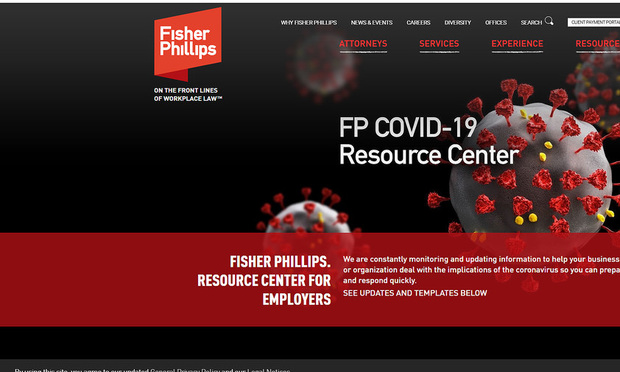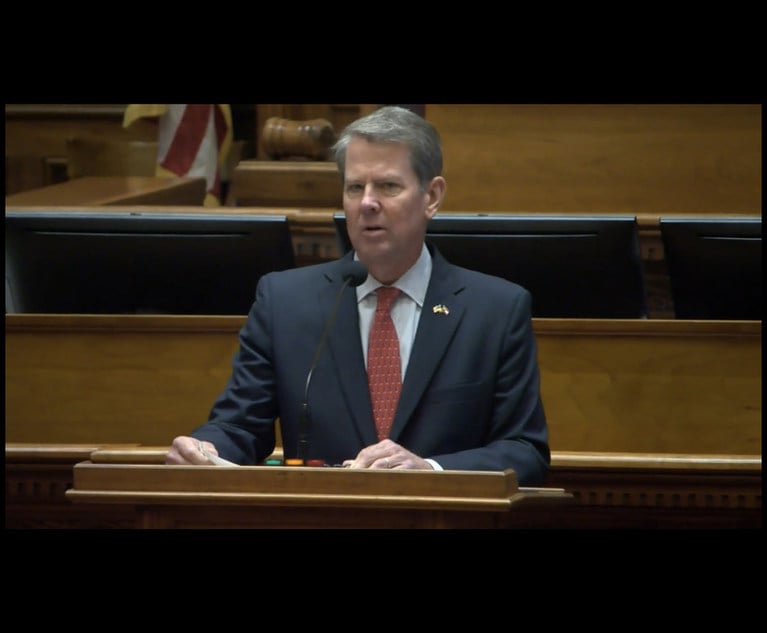Fisher & Phillips Rapidly Launches 'Shelter-in-Place' Practice
It's a sign of the times. The firm's task force to help clients determine if they can stay open was just a concept Thursday. The firm launched it Monday.
March 24, 2020 at 02:45 PM
4 minute read
 Fisher Phillips COVID-19 website. (Courtesy photo)
Fisher Phillips COVID-19 website. (Courtesy photo)
In a sign of the times, Atlanta-based labor & employment firm Fisher & Phillips on Monday launched a task force to address an issue that didn't even exist until last week: What companies qualify for the "essential business" exemption from rapidly proliferating shelter-in-place orders?
Fisher & Phillips launched the new practice just hours before Atlanta's mayor issued a "shelter-in-place" order at midnight on Monday that effectively shut down activities by all city businesses except those deemed essential.
Last week, San Francisco issued the first shelter-in-place order, effective March 16. About 10 states and numerous other cities made similar orders.
 Roger Quillen
Roger QuillenRoger Quillen, the national workplace law firm's chairman, said it was only last Thursday that firm lawyers considered setting up an essential business task force. "Our phones were burning up" last week, he said, with calls from worried clients asking whether they could stay open.
City and state directives on what constitutes an essential business can be confusing and vague, plus there is variation by jurisdiction, so it's an area where clients are seeking guidance, Quillen said.
"This is a practice area that didn't exist for our firm when we started asking ourselves about it on Thursday," he said. "It was a concept then, we had the task force in place on Friday, and a number of people worked all weekend."
By late Monday the new practice was up and running, with a resource center on the firm's website that tracks "shelter-in-place" orders by state and city as they are announced. (Fisher & Phillips had already revamped its website's homepage to exclusively feature its COVID-19 resources and client guidance.)
That's how fast things are happening in workplace law, Quillen said, adding that the firm has never started a new practice initiative so quickly.
Some essential businesses are obvious across jurisdictions–for instance, health care, grocery stores, banks and telecommunication companies. But the rules are not as clear-cut for others, such as auto dealers, Quillen said.
Many car dealers have repair facilities, which are widely considered an essential business, he explained. Now that many carless urban-dwellers, such as millennials, consider public transit and rideshares too risky, there may be a rising need for car purchases—including used ones.
"We're finding that many businesses may qualify for the exempt categories because they're providing vital life services," Quillen said.
Clients initially ask what the rules are in a jurisdiction and whether their company fits the exemption, Quillen said. If it is not directly addressed, then they may want to petition an administrative agency for a broader exemption. Failing that, some are considering whether they can seek injunctive relief from a court.
Other national labor and employment firms, such as Littler Mendelson, Jackson Lewis and Ogletree Deakins Nash Smoak & Stewart, also have assembled extensive COVID-19 practices and offer copious online resources to assist clients. But representatives from these three firms said they hadn't started a practice area per se to address the new deluge of shelter-in-place orders.
An Ogletree representative said the firm is addressing client questions about shelter-in-place orders via its multi-disciplinary coronavirus rapid response team and online resource center.
Littler doesn't have a specific "shelter-in-place" practice, but the COVID-19 task force it started in January offers "comprehensive resources and guidance," a spokesperson said. Jackson Lewis similarly has a COVID-19 task force "to help clients decipher all of the confusing guidance coming out on a daily basis," a spokesperson said.
NOT FOR REPRINT
© 2025 ALM Global, LLC, All Rights Reserved. Request academic re-use from www.copyright.com. All other uses, submit a request to [email protected]. For more information visit Asset & Logo Licensing.
You Might Like
View All

Trump Fires EEOC Commissioners, Kneecapping Democrat-Controlled Civil Rights Agency

Panel to Decide if Governor Should Suspend Georgia Lawyer From Elected Post
4 minute read
Law Firms Mentioned
Trending Stories
- 1'Reverse Robin Hood': Capital One Swarmed With Class Actions Alleging Theft of Influencer Commissions in January
- 2Hawaii wildfire victims spared from testifying after last-minute deal over $4B settlement
- 3How We Won It: Latham Secures Back-to-Back ITC Patent Wins for California Companies
- 4Meta agrees to pay $25 million to settle lawsuit from Trump after Jan. 6 suspension
- 5Stevens & Lee Hires Ex-Middle District of Pennsylvania U.S. Attorney as White-Collar Co-Chair
Who Got The Work
J. Brugh Lower of Gibbons has entered an appearance for industrial equipment supplier Devco Corporation in a pending trademark infringement lawsuit. The suit, accusing the defendant of selling knock-off Graco products, was filed Dec. 18 in New Jersey District Court by Rivkin Radler on behalf of Graco Inc. and Graco Minnesota. The case, assigned to U.S. District Judge Zahid N. Quraishi, is 3:24-cv-11294, Graco Inc. et al v. Devco Corporation.
Who Got The Work
Rebecca Maller-Stein and Kent A. Yalowitz of Arnold & Porter Kaye Scholer have entered their appearances for Hanaco Venture Capital and its executives, Lior Prosor and David Frankel, in a pending securities lawsuit. The action, filed on Dec. 24 in New York Southern District Court by Zell, Aron & Co. on behalf of Goldeneye Advisors, accuses the defendants of negligently and fraudulently managing the plaintiff's $1 million investment. The case, assigned to U.S. District Judge Vernon S. Broderick, is 1:24-cv-09918, Goldeneye Advisors, LLC v. Hanaco Venture Capital, Ltd. et al.
Who Got The Work
Attorneys from A&O Shearman has stepped in as defense counsel for Toronto-Dominion Bank and other defendants in a pending securities class action. The suit, filed Dec. 11 in New York Southern District Court by Bleichmar Fonti & Auld, accuses the defendants of concealing the bank's 'pervasive' deficiencies in regards to its compliance with the Bank Secrecy Act and the quality of its anti-money laundering controls. The case, assigned to U.S. District Judge Arun Subramanian, is 1:24-cv-09445, Gonzalez v. The Toronto-Dominion Bank et al.
Who Got The Work
Crown Castle International, a Pennsylvania company providing shared communications infrastructure, has turned to Luke D. Wolf of Gordon Rees Scully Mansukhani to fend off a pending breach-of-contract lawsuit. The court action, filed Nov. 25 in Michigan Eastern District Court by Hooper Hathaway PC on behalf of The Town Residences LLC, accuses Crown Castle of failing to transfer approximately $30,000 in utility payments from T-Mobile in breach of a roof-top lease and assignment agreement. The case, assigned to U.S. District Judge Susan K. Declercq, is 2:24-cv-13131, The Town Residences LLC v. T-Mobile US, Inc. et al.
Who Got The Work
Wilfred P. Coronato and Daniel M. Schwartz of McCarter & English have stepped in as defense counsel to Electrolux Home Products Inc. in a pending product liability lawsuit. The court action, filed Nov. 26 in New York Eastern District Court by Poulos Lopiccolo PC and Nagel Rice LLP on behalf of David Stern, alleges that the defendant's refrigerators’ drawers and shelving repeatedly break and fall apart within months after purchase. The case, assigned to U.S. District Judge Joan M. Azrack, is 2:24-cv-08204, Stern v. Electrolux Home Products, Inc.
Featured Firms
Law Offices of Gary Martin Hays & Associates, P.C.
(470) 294-1674
Law Offices of Mark E. Salomone
(857) 444-6468
Smith & Hassler
(713) 739-1250






